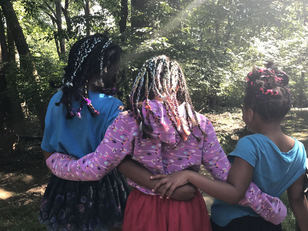 I found a pile of papers on the kitchen floor that I recalled instructing someone to discard. In my discontent I began to bend down and pick it up but stopped. “This isn’t reinforcing good habits”, I said in my head. Screw this. I called in the accused... “Sorry mom, but the reason I did this was...” I stopped her right there. I knew where this was going... another 5 or 10 minute conversation, with me listening to an excuse or a motive that I really didn’t care to entertain, mostly because I was exhausted, but also because I knew this wasn’t going to get the paper off the floor. “I don’t care about your reason. What’s done is done. What are we going to do about it now?”, I said. “But mom I had a good reason to do that”. She was convinced that if she could tell me why, somehow I would be happier. “This is not a situation where your reason is important. This is a situation that requires action… and maybe an apology...” In our house, major and minor atrocities happen just like they happen in everyone else’s home. People hurt people’s feelings and call people names. People take things that don’t belong to them just because they think they can. People occasionally defy their parents, occasionally. But we do not linger in the motive of our actions. We apologize. We move forward. Thinking of motive takes energy and time away from action, reconciliation, and reparation. When we focus on why someone did something, we are thinking of the past. We are requiring our minds to think back (hopefully with empathy) to the moments leading up to, and then after, the moment when the issue occurred. With motive at the forefront of parenting strategy, we are living a truth that is no longer existent. We are thinking about everything else but how the actual confrontation affected the mistreated person. The attention is taken away from the sufferer and applied to the aggressor. Our society is more obsessed with “why” than “how” or “what”. This is reflected in the popular parenting question, "What were you thinking?". Shifting focus from the aggressor's actions requires a slight change in questioning- it takes mindful parenting and awareness in the moment. Mindfulness is a simple technique that emphasizes paying attention to the present moment in an accepting, nonjudgmental manner. Tapping into the moment judgement-free, creates a space for solutions. Parents can now ask the “how” and “what” questions that get to the root of alleviating the pain of the sufferer and absolving the debt of the aggressor. Here are example questions we should be ask our children when there’s conflict between siblings and friends:
When I ask these questions, it forces my kids to be mindful of their actions- accessing the empathy available in the moment. These questions make them think critically about solutions as if they had experienced the transgression themselves. With our thoughts in the present and in the future, not the past, we can create acceptable solutions. It is no longer about what I did but about what I can do right now to make it better. I will admit that there are scenarios where motive is important- taking a risk that involved our moral compass for example. I make sure my children still have my open, in the moment, judgement-free ear in regard to scenarios where motive is critical to the solution. These are the moments where we have long discussions that reinforce family values and we check in to make sure we are all on the same page. (I’m anticipating more of these as the teen years come.) For now, most of the troubling situations in our home are the quick and dirty trespasses that do not depend upon a motive but moreover require some solution to rectify the situation. It’s up to each parent/family to determine when motive is important. For us we try to be as action oriented as possible, which requires us to access and activate our empathy, which requires us to be mindful and in the present. Learn more about mindfulness and other parenting techniques here:
0 Comments
Your comment will be posted after it is approved.
Leave a Reply. |
I'm a former teacher and former college athlete, currently working to make life more equitable for all people. My mission is to get parents to partner with their child's teacher.
|
